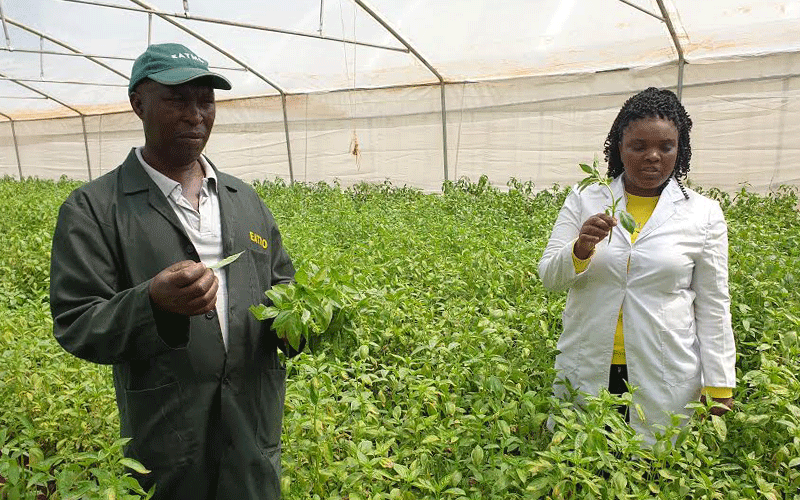Thyme export market rebounds

Geoffrey Wachira is upbeat as he receives visitors in EATMO farm in Subukia, Nakuru county on a chilly July day.
Pointing at the thyme crop that dominates the spice and herbs at EATMO, Wachira, a manager at the farm is happy about the changing fortunes of the crop since the Covid pandemic broke out.
When the outbreak begun early in the year, leading to travel restrictions and closure of global markets, the farm that grows thyme crop for export felt that they were doomed.
“We felt the breakout of the pandemic was the end for us,” says Wachira.
But in recent months, there has been an increase in demand for herbs in European markets giving the farm hopes of making good returns.
Thyme, says the farm’s exporter Ruth Munyoro, is among the easiest herbs to grow, yet it has a high demand especially in Russia and Europe, and fetches a good price.
Unlike many herbs and spices, thyme does not need to be grown in a greenhouse, and requires only drip irrigation in an open field.
Besides, the crop can be harvested for up to 3-5 years before replanting.
The current export market price for thyme is €4.2 (Sh504) while a kilogramme of chives is selling at €7 (Sh840). With rising demand these prices are likely to increase steadily.
Wachira notes that the farm that produces herbs and spices mainly for the export market suffered a temporary setback when more than 30 workers were sent home earlier in the year and only five were retained.
However, he has since increased this number to 20, after hiring mostly local youth and women, thanks to the rising demand for herbs and spices in Europe. “We can see some light at the end of the tunnel,” he says.
Increased demand
The workers are working round the clock to beat the export deadline in October–November when thyme is expected to reach the overseas market.
It is the first time since March that this farm is exporting produce to foreign countries, especially to the European market where thyme is on high demand. 
Photo/PD/Courtesy
The Covid-19 pandemic has immensely affected the fresh produce export sector.
The pandemic caused massive job losses for employees and hefty losses among investors in this sector.
In a recent report on how the pandemic has affected African farmers, John Oroko, Chief Executive Officer, Selina Wamucii, an agricultural company and social enterprise says Covid-19 came at a critical time.
“The Covid-19 pandemic has unfortunately come at a time when our farmers depend largely on exports to markets outside the continent,” he says.
The pandemic also broke out before the commencement of trading under the African Continental Free Trade Area (AfCFTA) that was scheduled to commence on July 1, 2020.
The AfCFTA founded in 2018 created a single continental market of more than 1.3 billion people, according to Oroko, intra-Africa trade is around two per cent while exports from Africa to the rest of the world range from 80 to 90 per cent of total exports, a huge share comprising of agricultural produce.
Munyoro is pleased with the recent turn of events, noting that thyme growers in addition to other herbs and spices should gear up for better days as the market is opening up.
“We are heading to peak season for fresh produce, which should be around October to November and I urge, especially the youth to invest in this sector,” she says.
Munyoro, who doubles up as an agronomist specializing in herbs and spices value chains, urges the youth to shun over dependence on employment, and instead focus on agri-prenuership.
Promoting competitiveness
A European Union (EU) funded project launched in Nairobi in October last year, to support value chains in herbs and spices is one among the opportunities targeting the youth and women.
“We are, especially optimistic that this project will enlighten Kenyans on the need to consume herbs and spices, so that we can secure market locally,” says Munyoro Dubbed Market Access Upgrade Programme (MARKUP), the four-year project set to be implemented in 12 selected counties across the country aims at promoting competitiveness and market access locally, regionally and internationally, for mangoes, passion fruits, chilli, macadamia, groundnuts, French beans, snow peas, herbs and spices.
Lack of knowledge
Munyoro says that many Kenyans lack enough knowledge on the health and aroma benefits of herbs, and take this produce as a reserve for the international market adding that thyme is beneficial for upper respiratory health.
Although the market for fresh produce is slowly opening up amid Covid-19, exporters are still decrying high cost of air transport.
In Egypt for example, farmers are receiving incentives from their government, lowering their cost of production .
The low cost has even made exporters lose business to Egypt, which has become a major competitor.
Fresh Produce Exporters Associations of Kenya (FPEAK) now wants the Kenyan government to offer subsidies in form of farm inputs like fertiliser, seeds and agro chemicals.
“The government should also facilitate increased market access for Kenyan produce, through the State Department of Trade,” says Hosea Machuki, CEO, FPEAK.
He advises farmers to prepare farm produce for export market with caution, ahead of October-November, when the peak season commences.
Machuki is optimistic that the transportation costs may get lower, once the passenger freights are back on air.
The passenger freights, he notes, ferry about 40 per cent of fresh produce, which is transported abroad.







